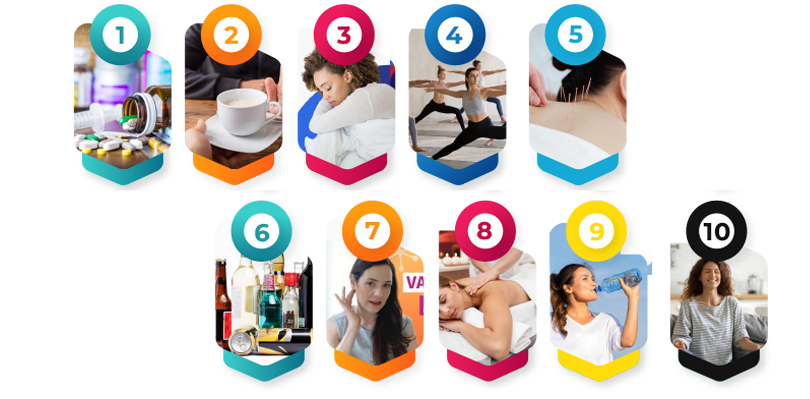Migraine is one of the most common types of headaches, affecting millions of people worldwide. It can be incredibly debilitating, causing intense pain, nausea, and sensitivity to light and sound. Fortunately, there are ways to reduce the intensity of such headache attacks and even cure them rapidly. This article will discuss how to cure migraine rapidly through proven tips and treatments.
How To Cure Migraine? Proven Treatment Strategies

1. Take Medication:
The most common way to treat migraine is with medication. Some medications, such as triptans and ergotamines, are specifically designed to target the neurological symptoms of it. Other types of medications can help relieve pain and nausea associated with migraines. It is important to discuss your options with a doctor before self-medicating.
2. Avoid Triggers:
There are certain environmental and lifestyle factors that can trigger migraines, such as stress, bright lights, loud sounds, and foods high in nitrates. Being aware of these triggers can help you avoid them and reduce the frequency of your migraine attacks. Taking steps such as reducing stress, avoiding caffeine and alcohol, and eating a well-balanced diet can also help prevent migraines.
3. Get Enough Sleep:
Getting enough sleep is an important part of managing symptoms. Lack of adequate rest can contribute to the onset of such headaches attacks, so it’s important to maintain a regular sleep schedule and get enough quality rest.
4. Exercise:
Regular exercise can help reduce the intensity of migraine attacks and prevent them from occurring in the first place. Low-impact activities such as walking, swimming, or yoga are especially beneficial for relieving stress and tension associated with migraines.
5. Acupuncture:
Acupuncture is a traditional Chinese medicine treatment that involves placing small needles into specific points on the body to restore balance. Studies have found that acupuncture can help reduce pain and frequency, making it an effective cure for migraine.
6. Avoid certain foods:
Certain foods, such as aged cheeses, processed meats, and chocolate, have been linked to an increased risk of migraines. Other foods that cause migraine are:
- Alcohol
- Caffeine
- Monosodium glutamate
- Aspartame
- Nitrates.
Eliminating these foods from your diet can help reduce the frequency of migraine attacks.
7. Stimulate Vagus Nerve:
The vagus nerve is a major component of the parasympathetic nervous system and it has been found to help reduce migraine pain. Stimulating the vagus nerve through deep breathing exercises, meditation, and massage can help reduce migraine symptoms.
8. Get a massage:
Massage therapy can help relieve migraine pain and reduce the frequency of attacks. Massages that target certain points on the body, such as the temples and forehead, can help ease muscle tension associated with migraines.
9. Stay hydrated:
According to a study not drinking enough water can contribute to migraines. Make sure you’re drinking enough water throughout the day and avoiding diuretics such as caffeine, alcohol, and sugary drinks.
10. Relaxation techniques:
Relaxation techniques such as mindfulness meditation, yoga, and progressive muscle relaxation can help reduce stress levels and may help to prevent migraine attacks.
Causes Of migraine
Migraines are caused by a variety of factors, including genetics, environment, and lifestyle. Common triggers for migraine include:
- Stress
- Lack of sleep
- Hormonal changes
- Bright lights or loud sounds
- Certain foods and beverages
- Weather changes
- Medications
- Dehydration
When To See A Doctor?
If you’re experiencing migraine symptoms, it is important to speak to your doctor. They can provide further advice on how to cure migraine, such as medications to reduce pain and frequency. If your symptoms are severe or if you have any concerns, it is best to seek medical advice as soon as possible.
In conclusion, migraines can be debilitating and uncomfortable but there are a variety of treatments available to help relieve pain and reduce the frequency of attacks. By being aware of your triggers, getting enough rest, exercising regularly, and avoiding certain foods and drinks, you can help reduce your migraine symptoms and improve your quality of life.
FAQs
How can I get rid of migraine pain naturally?
There are a few natural treatments for migraine pain such as relaxation techniques (such as mindfulness meditation, yoga, and progressive muscle relaxation), massage therapy, and acupuncture. Additionally, staying hydrated, getting enough sleep, and avoiding certain foods can help reduce symptoms.
What are the most common triggers for migraines?
Common triggers for migraine include stress, lack of sleep, hormonal changes, bright lights or loud sounds, certain foods and beverages, weather changes, medications, and dehydration. It is important to identify your triggers in order to reduce the frequency of attacks.
How is a migraine differentiated from the usual headache?
Migraines are often more severe and last longer than a typical headache. They can also be accompanied by other symptoms such as nausea, vomiting, sensitivity to light and sound, and visual disturbances. Additionally, a migraine may only affect one side of the head while a headache can be felt all over the head. If you have any concerns, it is best to speak to your doctor.
What should I eat when I have a migraine?
It is important to eat a balanced diet when you have any type of headache. Eating foods with complex carbohydrates, such as whole-grain slices of bread and cereals, should help to reduce symptoms. Ginger can also help you overcome it. Additionally, avoiding certain foods and drinks such as caffeine, alcohol, processed foods, and aged cheeses can help to reduce migraine attacks. It is also important to stay hydrated and get enough rest.
